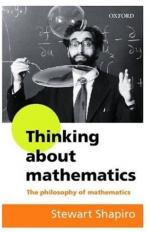|
This section contains 345 words (approx. 2 pages at 300 words per page) |
On the surface, there would seem to be little in common between mathematics and philosophy. These two disciplines, however, share a notable history of parallel academic pursuit as well as much nomenclature and concepts that apply equally well to both.
Classical Greek philosophers, particularly Plato (428 BC-347 BC) and Aristotle (384 BC-322 BC), saw not only math, but also philosophy, as hard, empirical sciences. Plato's Academy developed analytical methodology for arithmetic and plane geometry that was comparable to analyses used in philosophy. Platonic philosophers also sought to develop the mathematics of astronomy and musical harmony, which were then understood to be philosophical pursuits, and even see med to have an early grasp of Euclidean geometry. The arithmetic they recognized consisted primarily of methods of counting and measuring, and it was perhaps thanks to their philosophical bent that they spent much time and effort attempting to develop mathematical systems to measure concepts which we now think of as unquantifiable, such as pleasure and pain.
Such pursuits demonstrate, to the modern mind at least, a seemingly inevitable divergence between mathematics and philosophy, that result in the gulf between them that we know today. But an open-minded consideration of how the ancient philosophers viewed mathematics, might gain us new insights into similarities that we wouldn't normally recognize as such. The concepts of paradox, infinity and even zero have profound philosophical implications. Philosophy and mathematics share the processes of postulates and axioms to argue theories. Even the concept of numbers themselves seem philosophical, when one considers that numbers, in of themselves, are unobservable; they are neither physical nor mental, neither moving nor at rest, have no mass or any definable location in space-time.
Does this mean that philosophy and mathematics share relevant parallels that should alter how we study them today? Probably not. It does mean, however, that the modern student should always remember that mathematics never exists in a vacuum; that it effects and is effected by a myriad of other disciplines, and that a rich symbiosis of knowledge and learning is the result.
|
This section contains 345 words (approx. 2 pages at 300 words per page) |


